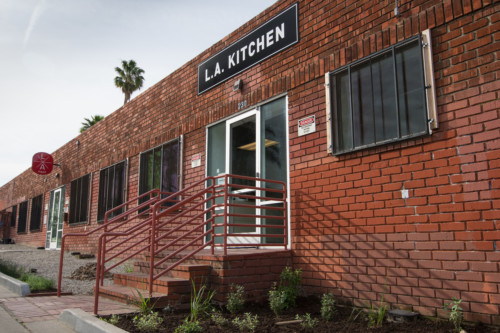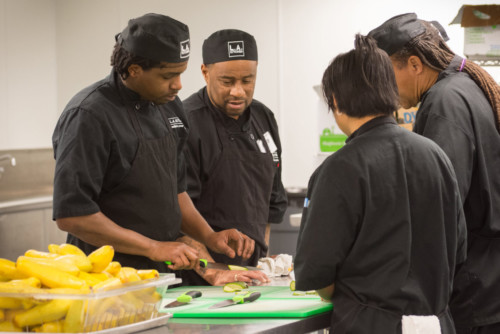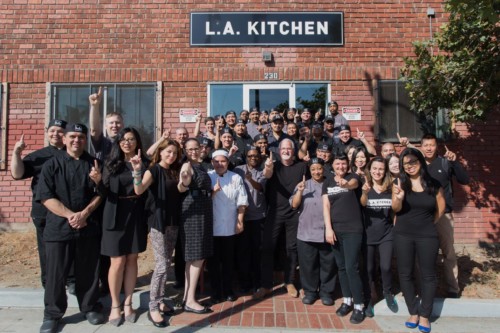
L.A. Kitchen’s Food Service Model Is One We Should All Aspire To
“Wrinkled food, wrinkled people, no waste.”
It’s a simple creed but an effective one, and one Robert Egger, founder and president of L.A. Kitchen, has followed to great success. (Egger has previously employed a similar model as the founder of D.C. Central Kitchen, which since 1989 has employed adults recently released from prison, and other individuals with high barriers to employment.)
“Los Angeles happens to be home to the largest concentration of older people,” Egger explains to GC. “One of the most important issues for [the millennial] generation is that my generation stays healthy, lives independently, and stays productive for as long as humanly possible… Every town needs to fixate on how are we going to feed this older generation of people– who are going to be the most nutritionally-sophisticated generation. The level of poverty is going to explode when my generation hits,” he comments, reflecting on the lack of wide-spread knowledge about food insecurity among Boomer populations. “Unlike previous generations, our generation is saddled with debt. What you’re going to see is a generation that doesn’t have enough money in the bank for extra years… [and] Charity’s not ready for that. Charity’s used to redistributing the junk that’s leftover.”
In the hopes of alleviating the food supply strain that often pins healthy options against affordability, L.A. Kitchen gathers cosmetically imperfect food from local farms, and trains foster youth and adults transitioning out of prison to produce nutritious meals for social service agencies, most of which serve aging populations. (A slaw made from kale stems and vegetarian beef jerky made from eggplant were among the kitchen’s recent creations as of GC’s visit.)
Participants in the program partner with restaurants during their internship, and are given job placement support when they finish the program. Operating parallel to this system is Strong Food, L.A. Kitchen’s for-profit facet that secures food service contracts and hires graduates of the L.A. Kitchen program.
At the heart of the work is an intergenerational bridge, the idea of agriculture, as Egger stresses.
“Just as we throw away food, we throw away people who are wrinkled, or bruised, or dented,” Eggers says. “Can young help old acclimate to a sped-up world? What can they learn from each other while producing meals?… Ultimately, I try to make sure that the end user is being liberated, not held back,” he says. “I respect and understand the construct of charity and how it evolved, but I often say charity is about the redemption of the giver and not the liberation of the receiver. We’re interested in how we can do both.”
Unfortunately, not everyone is on board.
“There’s a multinational caterer that does most of the [senior meals around Los Angeles]. There’s obvious graft there. I didn’t anticipate that,” Egger reveals, speaking candidly about the challenges facing what seems to be an otherwise perfect model food model (or at least one we can aspire to). “Right now, we’ve had to pivot away from the original intent, which was to do contracts with the city’s Department of Aging. I wanted to do business with you– and you’re actually going to deny what could have been a powerful alliance to make more people better fed?”
As evidenced by the wall of revolutionary musicians (like the late, great Prince) and world leaders (like Worker’s Rights Advocate Larry Itliong) in his office, Egger is not one to accept the system at face value– a system that Eggers notes is “tethered to old constructs of how old people eat.”
Of his wall of inspirations, one image in particular influences Egger in his day-to-day work: a small black and white print depicting César Chavez ending his 25-day hunger strike with a piece of communion bread, given to him by Robert Kennedy.
“That’s always been my favorite picture because it represents to me the power of food. Often times we think the food movement is large and using lots of weight, like ‘I moved a billion pounds of food.’ But man, that was a white politician who was risking everything politically to stand in solidarity next to somebody, and use a small morsel of bread to symbolically say, ‘I am your ally.’
“I’ve had so many advantages, which is why I’ve had the luxury to be able to think, to not have to just chase money constantly,” Egger reflects of his own white, male allyship. “I’ve had the rarest of all rare things, which is the ability to stop and say, ‘Hm, we can do this!’ Most people don’t have the time. They’re head down just trying to make payments.”
In looking ahead, Egger hopes to eventually bring his system of healthy eating not just to the dinner table, but to stores as well.
“If you go to a grocery and look for something for a senior to eat, the only thing you’re going to find is Ensure, which is a liquid candy bar,” Egger laments. “We’re trying to say, ‘This is how far you can go, if you aren’t encumbered by artificial constructs of what a meal looks like’, or where you source food, or who your employees are, or what your business model looks like.”
Yet with all of his accomplishments, Egger is ever humble. As he says in his own words: “I didn’t come out here to make money. I came out here to make change.”
L.A. Kitchen is located at 230 W Ave 26 in Los Angeles, California. To learn more about L.A. Kitchen and their mission, visit the organization’s website.




































